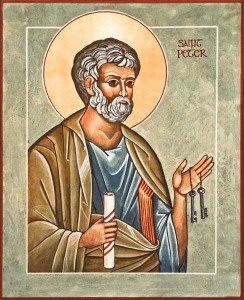I have been sharing thoughts about the first letter of Peter. It was probably a “circular” letter, carried and read to a number of communities in different locations. The recipients had been experiencing suffering because they were followers of Jesus. It would seem that the persecution was not necessarily lethal; no deaths are mentioned. It probably consisted of social ostracism which could have been severe because it meant the severing of friendships, family relationships, even financial relationships and even perhaps occasional acts of violence, even though they were not institutionally sponsored.
These communities were mostly made up of Gentile “God-lovers.” That they were Christian Gentiles is indicated in the letter. “You have already spent enough time in doing what the Gentiles like to do” (4:3) is an unlikely sentence if the letter was addressed primarily to Jewish Christ-communities. Then the author lists a series of typically Gentile vices as seen from a Jewish point of view. The real recipients were not Jews who had become Christian, but Gentile “God-lovers” who had become Christian.
Unlike many letters in the New Testament (NT), this one does refer to conflict within the Christ-communities. The conflict is with outsiders. There are no chastisements, though there are warnings and cautions about the situation of suffering being faced.
The letter combines affirmations about Jesus, God, and the new life with exhortations, moral teaching and also encouragement. The rhythm is repeated again and again:
Affirmation in 1:3-12,
Exhortation in 1: 13-17
Affirmation in 1:18-25
Exhortation in 2:1-3
Affirmation in 2:4-10
Exhortation in 2:11-4:11
Some of the exhortation is quite general:
Prepare your minds for action; discipline yourselves; set all your hope on the grace that Jesus Christ will bring you when he is revealed. Like obedient children, do not be conformed to the desires that you formerly had in ignorance.Some exhortation is very specific. The recipients are to “accept the authority of every human institution,” including the emperor and governors. Slaves are to accept the authority of their masters, and wives the authority of their husbands. These exhortations reflect the growing accommodation of early Christianity to conventional cultural values, a movement away from the radicalism of Jesus and Paul.
You are encouraged to pick up your New Testament and read 1 Peter.

